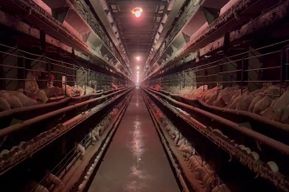
We have 30 days to take on Goliath – again
November 12, 2025
October 8, 2021
Last year we wrote that plant-based alternatives are growing faster than ever in Russia. At the beginning of 2020, around 10% of Russians were already eating plant-based alternatives and 54% were willing to include them in their diet. A new study made by the Eating Better campaign shows new encouraging results!

According to the study, in a year and a half, residents of Russian cities have begun to consume meat and milk alternatives, at least occasionally, 3 times more often (the share of consumers in the "meat" category increased from 10% to 34% and in the "milk" category – from 9% to 31%). Such plant-based alternatives are in the greatest demand among young people and consumers with high income.

Health concerns are still the main reason why Russians are ready to include plant-based substitutes in their diets (56%). Consumers also value natural taste (49%) and lower price (33%) of the alternative products in comparison to their traditional counterparts. At the same time, the cost of plant-based analogues on the market remains quite high on average, meaning that meat and dairy alternatives are most often purchased by people with high income.
Thanks to an increase in the number of local producers, prices of alternatives are gradually decreasing. For example, the cost of the EFKO plant-based burger patties is already close to the cost of beef. It’s also nice to see that more alternatives to chicken meat are appearing on the Russian market. Last year, EFKO launched plant-based chicken nuggets, while Greenwise produced plant-based chicken fillet and is currently working on liquid egg alternatives. In the absence of EAT Just brand products on the Russian market, the creation of similar types of egg alternatives is one of the most expected developments here.

Environmental and ethical concerns are still the most unpopular topics among Russian consumers (10% and 6% respectively). Nevertheless, the number of people, who value sustainability of the product production, more than doubled during the last 1,5 years. One of the contributing factors to this increase could be linked to the growing attention of the Russian government to clean technologies and sustainable production. In early June, the president of Russia devoted 12 minutes of his speech to the topic of climate problems at the St. Petersburg Economic Forum. The speech did not focus on livestock production, but he mentioned environmental goals are unreachable without addressing animal agriculture. Moreover, at the beginning of July, the Presidential Council for Civil Society and Human Rights published environmental recommendations that included a reference about damage caused by livestock farming and the need to subsidize and develop a plant-based alternatives sector.
Interesting results were obtained with regard to the attractiveness of different labels. In 2020, the difference in attractiveness between "plant-based" and "vegan" labels was 6% (23% and 17%, respectively). However, the new study shows that the "100% plant-based product" label is more than 11 times more attractive than the "100% vegan" label (58% and 5%, respectively)! The difference in the significantly increased positive perception of the "plant-based" label can be largely attributed to the fact that some of the largest producers of alternative products use «plant-based» rather than «vegan» terms and initially position their products not for a narrow niche of vegetarians and vegans, but for a wider circle of flexitarians:

"Made from plants. Made for everyone" is Greenwise’s company slogan.
"Taste of meat, benefit of plants" - the slogan of the EFKO Group brand "Hi!"
"It's like meat, but made from plants" - says Meatless company slogan.
We already knew that meat reduction in Russia is not as popular as it is in Western Europe. However, the results of the study show that it is on the rise in Russia as well. 40% of the survey respondents said that they began to eat significantly (16%) or moderately (24%) less meat products and 21% of the participants consumed less dairy products than a year ago. On the contrary, only 6% of the interviewed said that they started to eat more meat and 21% consumed more dairy during this period of time. Considering that the level of meat production in Russia in 2020 was higher than ever, such controversial results may be partly due to increasing meat exports to other countries or a different perception of the term “significantly less” by the survey participants.
At the same time, we can confidently talk about the growth of plant-based products sales. "During the pandemic, we tripled our sales on average. I think the reason was not only the pandemic, which many people associate directly with the problem of animal products consumption, but also the organic growth of the market. Alternative products are becoming better and more accessible (both in terms of price and the number of locations where they can be purchased), which means that more and more people are becoming aware that products without animal ingredients are just as good as conventional products in terms of both organoleptic characteristics and cost», — said Artem Ponomarev, Greenwise CEO.

Right now our Russian team is working to ensure that producers and other stakeholders in the plant-based alternatives field become acquainted with the study so that they can promote their products in a better way. Currently, plant-based alternatives account for just around 1% of the Russian meat and dairy market. We will continue to provide relevant information about the benefits of introducing new alternatives to key stakeholders in order to speed up the growth of the plant-based substitutes market size and reduce the reliance on animal agriculture across Russia.